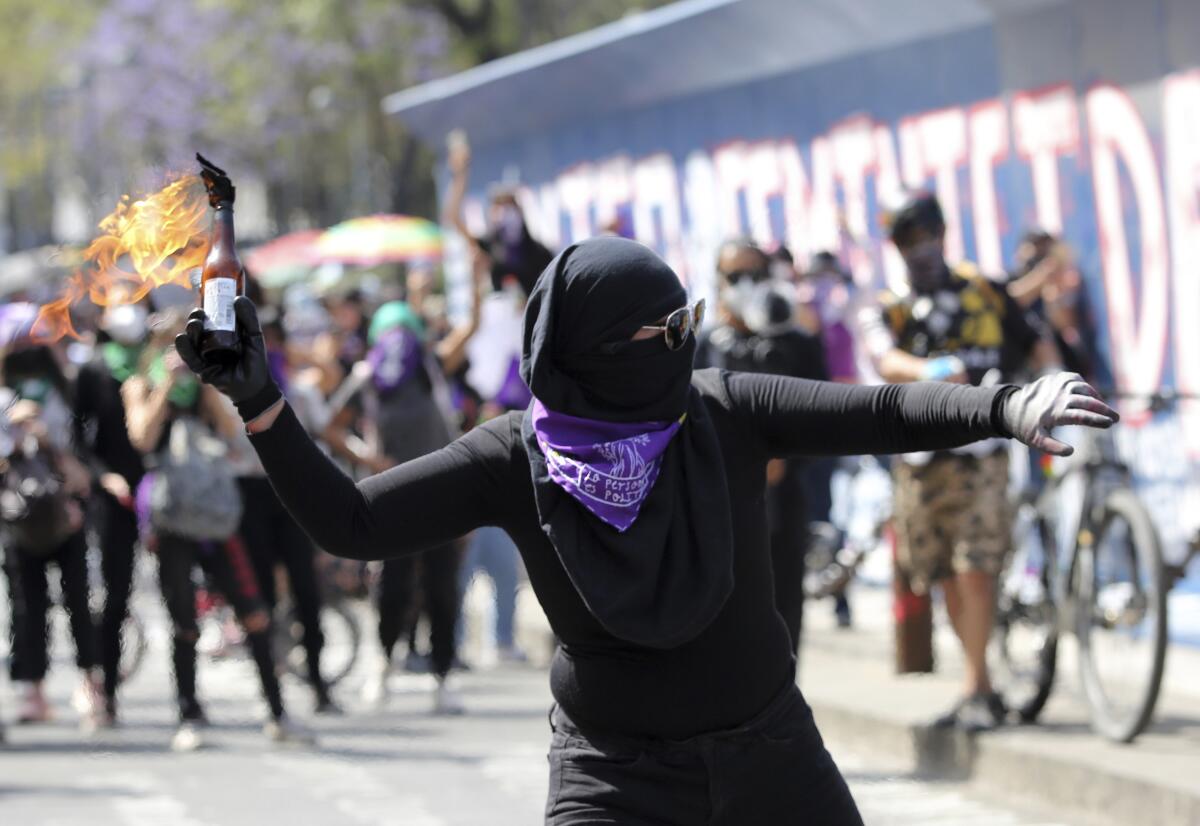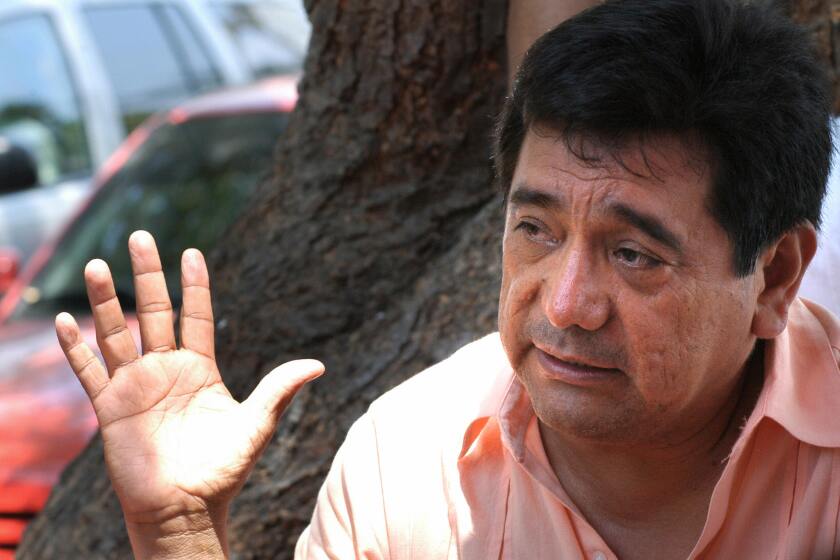Dozens injured as feminist protesters clash with police in Mexico’s capital

- Share via
MEXICO CITY — Volatile protests engulfed Mexico’s capital on Monday as police clashed with thousands of feminist activists calling for an end to what they say is a crisis of violence against women here.
In Mexico City’s central square, known as the Zócalo, police tear-gassed protesters who defaced city office buildings and used crowbars and hammers to tear down parts of a 12-foot-tall steel barrier erected around the National Palace, the center of Mexico’s federal government and the home of President Andrés Manuel López Obrador. Authorities said at least 62 police officers and 19 civilians were injured.
“We’re protecting your daughters and your sisters,” women chanted at the officers.
The protests, part of a series of feminist marches held around the world on International Women’s Day, come amid a scandal that has bitterly divided Mexico, pitting its ruling party against its increasingly visible feminist leaders.
For weeks, women around the country have been demanding that the party, Morena, drop its support for a gubernatorial candidate accused by five women of sexual assault.
Feminist opposition to a Mexican gubernatorial candidate accused of rape has become a political liability for President Andrés Manuel López Obrador.
López Obrador has stood staunchly by the candidate, Sen. Félix Salgado Macedonio, repeatedly dismissing the accusations as nothing more than partisan political attacks. “Enough already!” the president said at a recent news conference in response to questions about the allegations.
The president’s defense of Salgado has put him at odds with female leaders in his own party and the nation’s feminist movement, which has become perhaps the most organized opposition force López Obrador has faced since he won in a landslide in 2018.
Women have been protesting against violence in Mexico for decades, including in the 1990s, when they mobilized to call attention to the slayings of hundreds of women in the border city of Juarez.
But the feminist movement has grown increasingly visible in recent years, thanks in part to a more militant younger generation that has proved willing to deface property to call attention to what it sees as an epidemic of gender-based violence in Mexico, where an average of 11 women are killed each day.
Last spring, after a series of particularly gruesome killings in Mexico City that included the slaying of a 7-year-old girl, tens of thousands of women took to the streets in a historic march that ended with clashes between police and protesters, who covered some of the nation’s most iconic monuments with pink and purple graffiti.
Several months later, some of the same activist collectives that organized the march seized control of Mexico’s National Human Rights Commission, ripping paintings of revolutionary heroes off the walls and declaring that the building would become a shelter for female victims of violence.
Fearing similar actions during this year’s march, police over the weekend erected protective barriers in the Zócalo around major government buildings. Within hours, activists had covered the barriers with the names of women who have been killed by violence. Nearby, around a towering flagpole, they pasted pictures of men they said were rapists.
By early afternoon Monday, the square had filled with protesters, many of whom wore the green bandannas that have become the symbol of the pro-choice movement in Latin America in recent years.
“Abort this patriarchal system!” the women shouted as they burned a pile of trash that included plastic riot shields they had stripped from police.
One woman, 26-year-old Fernanda Grostieta carried a large banner printed with the photo of a pretty teenage girl with short hair and glasses. “Have you seen her?” the poster read.
Grostieta said the young woman, a schoolmate of hers, disappeared four years ago after complaining of domestic abuse at the hands of her romantic partner. Grostieta believes he killed her.
The issue of violence against women isn’t abstract, she said: “For all of us this is personal.”
The allegations against Salgado were made public last fall, when it became clear that he would be the candidate for governor in Guerrero state for Morena, a center-left party founded by López Obrador.
Among the accusers are a woman who told police in 2016 that Salgado had drugged and raped her. She said Salgado recorded a video of the first attack and used it as blackmail to rape her on at least two more occasions. Another woman, a Morena activist and longtime supporter of López Obrador, told police that Salgado had raped her in 1998 when she was 17 years old.
Salgado Macedonia has not been charged with any crime. He denies the allegations.
In a letter to party leaders last month, some of Morena’s most prominent female officials urged the party to drop its support for Salgado, a move that some analysts said showed the growing influence of feminist street protests.
Cecilia Sanchez in The Times’ Mexico City bureau contributed to this report.
More to Read
Sign up for Essential California
The most important California stories and recommendations in your inbox every morning.
You may occasionally receive promotional content from the Los Angeles Times.












